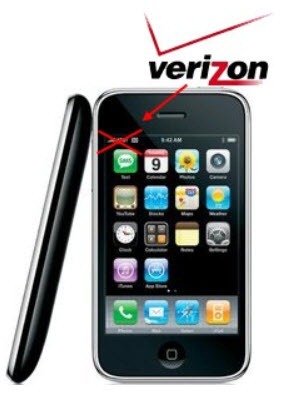You probably saw the news that Verizon will begin selling a version of the iPhone that will run on its network starting February 10. We’re very conscious of Verizon’s business plans in the North Bay, since AT&T’s presence up here is feeble at best and Sprint and T-Mobile are non-starters. I’ll give you just a few extra bits of information.
- iPhone vs. Android Now that everyone will finally have a fair chance to compare the iPhone side by side with Verizon’s extensive selection of Android phones, you’ll see endless arguments about which one is “better.” That’s not the right question. The question is whether you are forced to choose one or the other by your email setup or your computer or other devices. Example: If your email is run by Exchange (a hosted Exchange account run by Microsoft Online Services, say), all the phones are fine; if you have an established relationship with Google and Gmail, only an Android phone will make you happy. If you’re tied to iTunes or have a Mac or iPad, an iPhone will interact with them nicely. Not every combination will work! If you’re not driven one direction or the other, you could flip a coin and come out happy either way.
- World phone
Verizon’s iPhone will work with the global CDMA network, making it a better world phone than AT&T’s iPhone. As always, traveling outside US borders with a phone is risky business – check carefully on international roaming charges and make sure you don’t get a 300-page bill delivered by courier when you get home!
[Edit 01/12/11: Wrong! Got that backwards. AT&T’s GSM system is the global standard, it’s Verizon’s CDMA system that is US-centric. Here’s an explanation of the two standards. Verizon called out the “global” capabilities of its iPhone (and here’s one blogger who’s wondering what that’s about), but it’s the AT&T version that makes a better world traveler.
[The real holy grail for travelers would be an iPhone with the ability to talk to both GSM and CDMA networks. Many rumors – perhaps the next generation.]
- 3G vs. 4G The first Verizon iPhone won’t work with the new, faster 4G networks. That’s not important. We’re unlikely to see 4G service in the North Bay from any carrier for a good long time. In any case, it’s still unclear why most people should care about the speed of the Internet connection on a smartphone – the speed of an uncongested 3G network is far more than most of us will need for the next couple of years. (AT&T has been congested. Verizon says it won’t be overwhelmed, no matter how many smartphones it sells. We’ll see.)
- Tethering and hotspots There is one new use of a smartphone that will become more popular, and in this case speed does matter. Verizon allows its phones to be “tethered” to a computer as a source of an Internet connection, for an extra monthly fee. Almost all Android phones have a tethering program built in for USB or Bluetooth connections to a nearby computer. Verizon will let the iPhone be used as a hotspot for multiple computers over USB, Bluetooth, or 802.11 wifi. This is cheaper and easier than carrying around a MiFi or USB modem for your notebook or tablet – welcome news for everyone tired of messing with 802.11 wireless connections on the road. Expect lots of fuss about whether the data use is unlimited or capped, and how much Verizon gets to charge for overages.
Side note for Android owners: it’s possible to get the same result with a free app named PDANet and – maybe – sidestep Verizon’s monthly tethering fee. The only problem is, Verizon probably doesn’t like that a bit and there’s some well-justified paranoia about whether Verizon will start identifying people using PDANet and terminating their service or sending big bills or killing their dogs. Experiment at your own risk!
- Verizon iPads An interesting tidbit obtained by Bloomberg: at some point Verizon will start selling iPads with built-in chips to connect to the Verizon network, a nice choice for those of us wishing to avoid AT&T at all costs.


